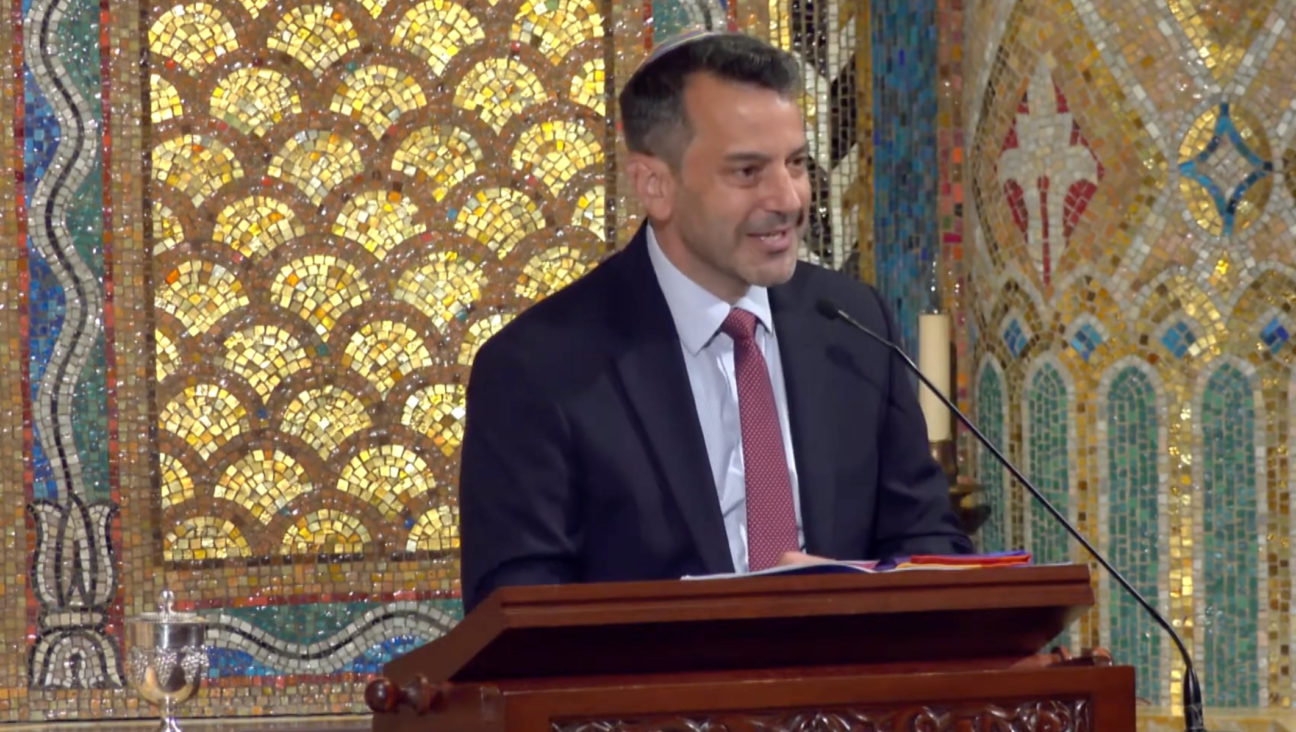Impeachment of Alejandro Mayorkas, opposed by coalition of Jewish groups, narrowly fails
A number of Jewish groups and the White House said the impeachment process was marred by antisemitism

U.S. Homeland Security Secretary Alejandro Mayorkas speaks during a press conference at the U.S. Department of Justice in Washington D.C., Dec. 6, 2023 in Washington, DC. (Photo by Samuel Corum/Getty Images)
WASHINGTON (JTA) — The U.S. House of Representatives narrowly voted against impeaching Alejandro Mayorkas, the Jewish homeland security secretary, after a process that a number of Jewish groups and the White House said was marred by antisemitism.
The vote Tuesday evening was 216 against to 214 for impeachment, a stunning loss for House Speaker Mike Johnson, the Louisiana Republican. Four Republicans voted against impeachment in the narrowly-split chamber. Johnson had championed the impeachment even in the face of evidence that it might not pass.
Right-wing Republicans have been agitating for a year to impeach Mayorkas, who they say is neglecting the migrant influx at the U.S.-Mexico border to an extent that amounts to high crimes and misdemeanors — the constitutional standard for impeaching a public official. There has recently been a record number of migrants, more than 10,000 per day, crossing the southern border.
The impeachment vote came as House Republicans, including Johnson, have vowed to vote against a bipartisan Senate bill that would bolster border security while providing aid to Israel and Ukraine. Republicans on the right, as well as their likely presidential nominee, Donald Trump, say thre bill’s border provisions do not go far enough. The impeachment was voted down on the same night that a standalone bill on aid to Israel also failed in the House.
Democrats have defended Mayorkas’ performance, and a handful of Republicans have said that while they believe his performance is subpar, impeaching officials for being bad on the job would set a precedent that would lead to chaos. Mayorkas would have been the first cabinet official impeached in a century and a half.
Jewish opponents of impeachment have also said the anti-Mayorkas rhetoric has echoed antisemitism. Seventeen Jewish groups released a statement Monday, ahead of the vote, saying the impeachment process could “further normalize dangerous antisemitic, white supremacist, and anti-immigrant conspiracy theories.”
The groups cited repeated allusions by Republicans to the “Great Replacement,” a theory that claims Jews are behind an effort to replace white Americans with immigrants of color.
“Attacks against Secretary Mayorkas have invoked the so-called ‘great replacement’ theory, which relies on dangerous antisemitic stereotypes in alleging a vast conspiracy to support an ‘invasion’ of immigrants, ‘replace’ white voters, and seize power in the United States, while also fueling anti-immigrant bigotry and white supremacy,” said a release accompanying the statement. The groups that signed the statement included HIAS, the main Jewish immigration advocacy and refugee aid group; the National Council of Jewish Women; the Jewish Council for Public Affairs; and arms of the Reform, Conservative and Reconstructionist religious movements.
In a bid to prove Mayorkas’ intent to break the law, a key requirement in any impeachment, Rep. Mark Green, the Tennessee Republican who is the chairman of the Homeland Security Committee and who authored the impeachment charges, last month said Mayorkas wanted to “fundamentally change the population of the United States, and I believe to empower the Democrat party in perpetuity.”
Rep. Marjorie Taylor Greene, the Georgia Republican who has come under fire for her association with antisemitic figures and theories, at one point filed an impeachment resolution that repeatedly accused Mayorkas of failing to protect the United States from “invasion,” although hers was not the impeachment resolution under consideration on Tuesday.
The American Jewish Committee separately this week sent a letter to every House representative urging against impeachment, in part because of the rhetoric surrounding the debate.
“Some assert that Secretary Mayorkas is purposefully allowing increased numbers of migrants to enter the border in order to alter the demographics of the United States, alluding to the Great Replacement conspiracy which is rooted in the belief that the white race is under threat of extinction at the hands of Jews and other minorities,” said the letter, which AJC shared with the Jewish Telegraphic Agency. “This type of dangerous rhetoric is dangerous to Jews, Latinos, and all vulnerable minorities.”
Concerns about antisemitic rhetoric were compounded on Tuesday ahead of the vote when Politico reported that Green, in a heated meeting with Republicans opposed to the impeachment, called Mayorkas a “reptile without balls.” The White House condemned the statement, calling it “vile” antisemitism. Green denied antisemitic intent.
Mayorkas, whose mother was a Holocaust survivor who immigrated to Cuba, and then fled to the United States with her Jewish husband, is close to the Jewish community. He had led advocacy for increased security grants for Jewish institutions, both in his current role and when he was deputy secretary in the same department under President Barack Obama.
He has said his sensibility as the child of Jewish refugees has shaped his outlook, a factor that helps explain the outspoken Jewish defenses on his behalf.
“When an antisemitic, anti-immigrant conspiracy is evoked to take down a Jewish public servant, who served on the board of the Hebrew Immigrant Aid Society, the same organization that helped bring my own family to the U.S. after the Holocaust, the same organization evoked by the perpetrator of the largest antisemitic attack in U.S. history, my antennae go up,” Abe Foxman, the retired national director of the Anti-Defamation League, wrote Tuesday in an op-ed for Time Magazine.
Green said he would try again to impeach Mayorkas. Any impeachment would be symbolic as the Democratic-led Senate would almost certainly not convict Mayorkas.
This article originally appeared on JTA.org.
A message from our Publisher & CEO Rachel Fishman Feddersen

I hope you appreciated this article. Before you go, I’d like to ask you to please support the Forward’s award-winning, nonprofit journalism so that we can be prepared for whatever news 2025 brings.
At a time when other newsrooms are closing or cutting back, the Forward has removed its paywall and invested additional resources to report on the ground from Israel and around the U.S. on the impact of the war, rising antisemitism and polarized discourse.
Readers like you make it all possible. Support our work by becoming a Forward Member and connect with our journalism and your community.
— Rachel Fishman Feddersen, Publisher and CEO




















